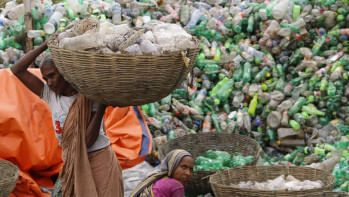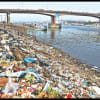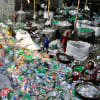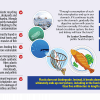Wider reform key to ending plastic menace

We appreciate the environment adviser's directive to ban the use of polythene and polypropylene bags in all superstores across Bangladesh. This, we hope, will be the first of many long-needed measures to rein in plastic pollution in the country. At present, chain superstores offer free bags, made from polypropylene, for customers to pack their groceries, although thin polythene and plastic bags were banned in 2002. According to the latest directive, instead of these bags, superstores will have to make jute or cloth bags available for purchase starting from October 1.
Although the order targets a small portion of commercial plastic usage in the country, smaller steps taken in phases might actually be more effective than issuing blanket bans that lose steam over time, as previously seen. The key here is enforcement, so the administration must ensure compliance from market managers and customers. It also must ensure that low-cost alternatives are easily accessible to wean customers off their dependence on plastics. Previous attempts to encourage jute bag usage have largely failed for supply shortages and lack of proper marketing. That said, the government should also consider schemes to promote research on and commercial production of eco-friendly alternatives like Sonali bags.
At the same time, campaigns can be launched to create awareness about the health and environmental hazards of plastics, encouraging customers and entrepreneurs to adopt the 3Rs—reduce, reuse and recycle—of waste management. Another area that requires awareness is proper disposal of plastics. Plastic litter is not only impacting our ecosystem, polluting waterbodies, or harming aquatic lives; it is also clogging sewers, drains, and canals and thus contributing to waterlogging in urban areas. While we understand that completely phasing out plastics may not be possible, reducing its usage and ensuring proper disposal are certainly doable.
In the long run, we hope that the environment adviser, having long fought for environmental causes herself, will be able to bring some much-needed reforms in the sector. Once the plastic ban in superstores takes effect, the authorities should gradually expand the scope of the ban by targeting various related industries including restaurants and packaging as well as all governmental and non-governmental institutions. They should also clamp down on polythene production and restrict the import of plastic products.


 For all latest news, follow The Daily Star's Google News channel.
For all latest news, follow The Daily Star's Google News channel. 









Comments